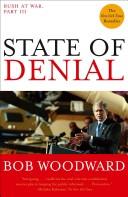Check nearby libraries
Buy this book

A secret Pentagon assessment sent to the White House in May 2006 forecasted a more violent 2007 in Iraq, contradicting the repeated optimistic statements of President Bush. This book examines how the Bush administration avoided telling the truth about Iraq to the public, to Congress, and often to themselves. In this detailed inside story of a war-torn White House, Woodward answers the core questions: What happened after the invasion of Iraq? Why? How does Bush make decisions and manage a war that he chose to define his presidency? And is there an achievable plan for victory?--From publisher description.
Check nearby libraries
Buy this book

Previews available in: English
Subjects
Decision making, Officials and employees, National security, Iraq War, 2003-, Military policy, Politique militaire, Terrorisme, Prise de décision, Bezettingen, Guerre en Irak, 2003-, Fonctionnaires, Bestrijding, Sécurité nationale, Politieke besluitvorming, Golfoorlog (2003), Iraq War, 2003-2011, Politics and government, War on Terrorism, 2001-, Causes, Military leadership, Recours à la force, Politische Entscheidung, Employees, Iraq War (2003-2011) fast (OCoLC)fst01802311, Politik, Krieg, Interventions étrangères, Elaboration d'une politique, Informationspolitik, Entscheidungsfindung, Politique de défense, Internationaler Terrorismus, (2003), Irakkrieg, Guerres, Regierung, New York Times reviewed, United states, politics and government, 2001-2009, Bush, george w. (george walker), 1946-, United states, military policy, National security, united states, War on terrorism, 2001-2009People
George W. Bush (1946-)Places
United States, Irak, États-Unis, Verenigde Staten| Edition | Availability |
|---|---|
|
1
State of denial
2007, Simon & Schuster Paperbacks
in English
- 1st Simon & Schuster trade pbk. ed.
0743272242 9780743272247
|
aaaa
Libraries near you:
WorldCat
|
| 2 |
eeee
Libraries near you:
WorldCat
|
Book Details
Edition Notes
"Bush at war, part III"--Cover.
Includes bibliographical references (p. 494-522) and index.
Classifications
The Physical Object
ID Numbers
Source records
Oregon Libraries MARC recordLibrary of Congress MARC record
Library of Congress MARC record
Better World Books record
Internet Archive item record
Promise Item
Work Description
"State of Denial examines how the Bush administration avoided telling the truth about Iraq to the public, to Congress, and often to themselves. Two days after the May report, the Pentagon told Congress, in a report required by law, that the "appeal and motivation for continued violent action will begin to wane in early 2007."" "In this detailed inside story of a war-torn White House, Bob Woodward reveals how White House Chief of Staff Andrew Card, with the indirect support of other high officials, tried for 18 months to get Defense Secretary Donald Rumsfeld replaced. The president and Vice President Cheney refused. At the beginning of Bush's second term, Stephen Hadley, who replaced Condoleezza Rice as national security adviser, gave the administration a "D minus" on implementing its policies. A secret report to the new Secretary of State Rice from her counselor stated that, nearly two years after the invasion, Iraq was a "failed state."" "State of Denial reveals that at the urging of Vice President Cheney and Rumsfeld, the most frequent outside visitor and Iraq adviser to President Bush is former Secretary of State Henry Kissinger, who, haunted still by the loss in Vietnam, emerges as a hidden and potent voice." "Woodward reveals that the secretary of defense himself believes that the system of coordination among departments and agencies is broken, and in a secret May 1, 2006, memo, Rumsfeld stated, "the current system of government makes competence next to impossible."" "State of Denial answers the core questions: What happened after the invasion of Iraq? Why? How does Bush make decisions and manage a war that he chose to define his presidency? And is there an achievable plan for victory?" "Bob Woodward's third book on President Bush is a sweeping narrative - from the first days George W. Bush thought seriously about running for president through the recruitment of his national security team, the war in Afghanistan, the invasion and occupation of Iraq, and the struggle for political survival in the second term."--BOOK JACKET
Links outside Open Library
Community Reviews (0)
Feedback?History
- Created October 16, 2008
- 13 revisions
Wikipedia citation
×CloseCopy and paste this code into your Wikipedia page. Need help?
| December 10, 2022 | Edited by ImportBot | import existing book |
| August 4, 2022 | Edited by ImportBot | import existing book |
| October 4, 2021 | Edited by ImportBot | import existing book |
| December 17, 2020 | Edited by MARC Bot | import existing book |
| October 16, 2008 | Created by ImportBot | Imported from Oregon Libraries MARC record |











